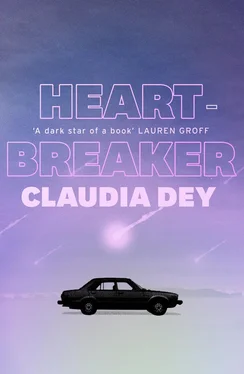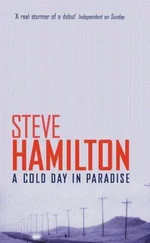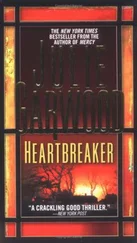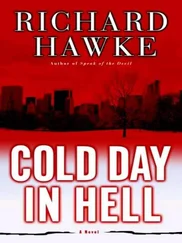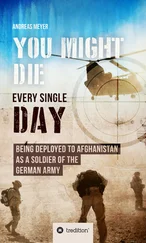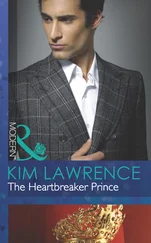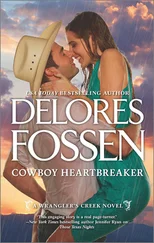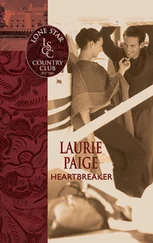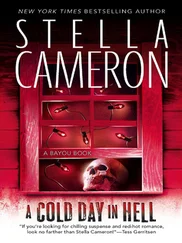It is very rare the portrait is of a woman, and if it is, she poses with her children, and if she does not have any children, she poses with nothing at all.
THE FOUNDERS GOT OFF their bus here only because they discovered they could go no farther—no farther than our property, bungalow 88, also known as the Last House. You see, the north highway ends in the territory’s only water source. It is directly behind our bungalow. We call it the reservoir, and now, in late October, it is mostly covered by a thin skim of ice. Where you can see it, the water is not blue but gray, branches floating on the surface, a few plastic bags. No one will go near it. Not even us, the teenagers, with our frayed cuffs and our open coats and our blue lips daring each other with money we have stolen. No way. Get real. Dream on. To our people, water is certain death. The reservoir is certain death. From my mother’s bedroom window, you have a perfect view.
Our bungalow is the only one in the territory with a second story and a basement, features added by its former occupant. Our bungalow is fully carpeted, eleven hundred square feet, and split-level. Our bungalow is open concept, and the color scheme is gold-black-beige. You’d think everyone would want to live here. They don’t. Our bungalow is the end of the world.
Yo.
“PONY DARLENE FONTAINE! Pony Darlene Fontaine!” I come to just in time to see the teen stewardess’s plane break apart. She is over a flatland when the cabin of the plane suddenly bursts open on one side, and the passengers, still strapped into their seats, are sucked out and into space. Worst luck. Permanent winter. Pointless to call out. The teen stewardess throws herself on top of a baby passenger. She and the baby float down on a piece of airplane, and the teen stewardess tells the baby they will make their home under it. You can make a home out of anything, my mother said to me once. Home is in the soul. You will spend your life trying to get back to it.
“Pony!” It’s Lana yelling at me through the receiver, which is dangling off our beige couch. “Did you see that? Did. You. See. That.” Lana, at moments of great excitement, will speak with the cadence of a telegram. We arrange to meet in tight clothes outside of her much nicer bungalow at ten o’clock. To go to the bonfire. The pit party. A full hour. Later. Than. Anyone. Else.
I hang up and look through our front window. The truck is not in the driveway. She did go into town. Did she go into town? I am briefly stopped by my own reflection. This happens when you can watch yourself grow. I am tall. Perhaps too much length in limb. I wouldn’t have minded being a bit more covert, physically. Perhaps slightly less face. The face is a little more niche than I might have liked. The full lips, the thin canopy of a mustache. The failed haircut. The dark, shy eyes. I am not the star of the night soap; I am the visiting cousin. The one in the Pinto no one will kiss. I have a line of safety pins tapering my nightpants. I knot my DEVOTIONAL SECTION T-shirt just above my waistline in case there is a boy in the woods smoking the cold fog, and looking in at me. Wanting me. A boy I have never seen before. He wears a black suit and has a black dog and a few terrible habits that don’t hurt anyone. I roll down the waistband of my nightpants and rotate my melancholia. Front on, profile, rear view. What is not to love? Some of it. Around my neck, I wear a large stopwatch. I took out the clock part and put in the back of Billy Joel’s head from Glass Houses . We have many album covers here and very few albums. Most have been destroyed by overuse. I have no idea how Billy Joel’s music sounds, but I like the look of him in his heeled leather boots and crime gloves about to seriously trash a house. I lift my arm and angle my body. All I need is a rock.
“Did she say why? Did she say for what? Why did you let her leave? Why didn’t you come and get me?” The Heavy is covered in sawdust. It is trapped in his eyelashes, his shirt collar, his knuckles, the hard scars of his face. He has his snowmobile goggles around his neck. I do not have sufficient answers to his questions. I assure him she will be back any minute.
The Heavy runs out to the driveway to follow my mother in our new truck only to remember it gone; she took it. “Damn it.” He pushes past me to the living room phone. He has sweat through his outerwear in three large circles. Two under his arms, and one, a bull’s-eye, spreading across his back. We agree the dog got out behind her. I do not tell him my mother was wearing her indoor tracksuit, no socks and no shoes. That she walked into late October without shoes. Was she even wearing a coat? With only the dog. Her keys and the dog. The Heavy calls Traps, his oldest friend, on speed dial. “She said she was going into town.” He pauses. “She took the truck.”
SEVENTEEN YEARS AGO, my mother showed up in the territory in a wreck. Three months ago, she drove our previous truck into a tree on an iceless day. A day without weather. Impossible to total your vehicle on that July day. The women of the territory gathered in Rita Star’s kitchen to review the crash. Rita Star had one of the few businesses in town not located on the north highway. She ran it out of her small, wood-paneled bungalow.
Rita Star’s Tanning Emporium, Fitness and Palmistry
The women of the territory tucked their ponytails into their waistbands and sat on Rita Star’s leatherette chairs under her hazardous light fixture. Rita Star had a strange and flammable hobby. Light fixtures made out of old Delivery Day baskets. The women concluded my mother was a woman who made her own obstacles. Why, the women of the territory asked each other in Rita Star’s dim kitchen, why in a world that is mostly obstacles would you make more for yourself? What sort of woman would do that? I mean, who would do that? And besides, who can leave her house at that hour, the dinner hour, when everyone needs everything?
WE HAVE ONLY the one truck. “We have only the one truck,” The Heavy apologizes to Traps when he walks through our front door. “I know,” says Traps, erect as a centaur, “I sold it to you.”
Traps’s face is eager. He smells like aftershave, cologne, and truck interior. Like a man at final resting. Snow melts and pools around his cowboy boots, leaving a ring of water on the ground, on my mother’s winter coat. It was her coat she was kicking out of the way. Why didn’t she take it? She loves her coat. When the territory had been warmer than any year on record, she had worn her coat all spring. I pick it up and hang it on her hook by the front door. We each have a hook. We used to be that kind of family.
The Heavy makes me swear I will stay in the house and, when she comes back, call Drink-Mart, and the men there will get the message to him. He will go with Traps in his truck. Everyone knows Traps’s truck. Traps is the only man with fog lights in the territory, and while this is annoying, it makes flagging him down easy. Since Traps owns the truck lot, Fully Loaded, he has access to certain features for his vehicle, and our men have to accept it when they are told the features were limited edition and no longer available. It was a one-time thing only, man. Sorry, man, sorry. No one sells regret better than Traps.
Traps also controls the fuel supply in the territory. In a giant padlocked shed at the back of the Fully Loaded property, he stores jerry cans filled with gasoline. Above the entrance to the shed, there is a video camera. Traps watches the footage from his trailer, also on the lot, where he conducts his business, surrounded by collages. This is his true passion. Traps cuts images from magazines and combines them on large pieces of paper. He hangs them in his trailer and angles spotlights above them. When a man buys a truck, he will comment on the collages, and Traps will remind the man the collages are for sale. Traps rotates his padlocks and wears a necklace of small keys. His neck is thick as a python. He also has keys buried throughout the lot. Only Traps knows where the keys are and which ones will unlock the stack of padlocks on the fuel shed. If a man wants fuel, he places a request, and within a day, Traps provides it. I need time, Traps explains to the man who wants the fuel and then sweeps his eyes over the lot. The man has no choice but to wait for Traps’s call. Sometimes, talking with the men, in his trailer, Traps will hold his lighter to his tongue and see how close he can get it. Once, when a man came in after the death of his wife, Traps pulled out the first aid kit and put a Band-Aid on the man’s heart. He then put one on his own heart in solidarity. No man knows how full or empty the fuel shed is. Territory men have considered trying to break in but lost their nerve. They have considered setting fire to the whole thing but pictured the inferno, and themselves inevitably part of it. What it comes down to is this: If you want to move, you have to see Traps about it. Traps gives motion to our people. Traps is too important to kill.
Читать дальше
